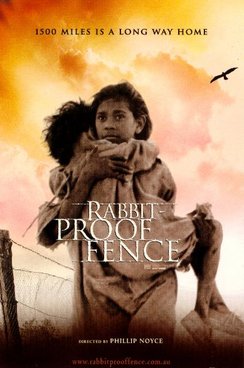
Rabbit-Proof Fence
Rabbit-Proof Fence is a 2002 Australian drama film directed and produced by Phillip Noyce based on the 1996 book Follow the Rabbit-Proof Fence by Doris Pilkington Garimara. It is loosely based on a true story concerning the author's mother Molly Craig, aunt Daisy Kadibil and cousin Gracie, who escaped from the Moore River Native Settlement, north of Perth, Western Australia, to return to their Aboriginal families, after being placed there in 1931. The film follows the Aboriginal girls as they walk for nine weeks along 1,500 miles (2,400 km) of the Australian rabbit-proof fence to return to their community at Jigalong, while being pursued by white law enforcement authorities and an Aboriginal tracker.[2] The film illustrates the official child removal policy that existed in Australia between approximately 1905 and 1967. Its victims now are called the "Stolen Generations".
For other uses, see Rabbit-proof fence (disambiguation).Rabbit-Proof Fence
Christine Olsen
Phillip Noyce
Christine Olsen
John Winter
Everlyn Sampi
Tianna Sansbury
Laura Monaghan
David Gulpilil
Kenneth Branagh
Veronika Jenet
John Scott
- 4 February 2002
93 minutes[1]
Australia
Walmajarri
English
USD$6 million
USD$16.2 million
The soundtrack to the film, called Long Walk Home: Music from the Rabbit-Proof Fence, is by Peter Gabriel. British producer Jeremy Thomas, who has a long connection with Australia, was executive producer of the film, selling it internationally through his sales arm, HanWay Films. In 2005 the British Film Institute included it in the BFI list of the 50 films you should see by the age of 14.
Production[edit]
The film is adapted from the book Follow the Rabbit-Proof Fence, by Doris Pilkington Garimara, which is the second book of her trilogy documenting her family's stories.[3] The other two books are Caprice: A Stockman’s Daughter (1991) and Under the Wintamarra Tree (2002)
Reception[edit]
Public reception[edit]
The film stirred controversy in Australia relating to the government's historical policy of removing part-Aboriginal children, who became known as the Stolen Generations, from Aboriginal communities and placing them in state institutions.[4][5] Eric Abetz, a government minister, announced the publishing of a leaflet criticising the film's portrayal of the treatment of indigenous Australians, and demanded an apology from the filmmakers. Director Phillip Noyce suggested instead that the government apologise to the indigenous people affected by the removal policy.[4]
Conservative commentators such as Andrew Bolt also attacked the historical accuracy of the film. Bolt criticised the numerous disparities between the film and Pilkington Garimara's novel, a fact that angered Pilkington Garimara, who said that Bolt had misquoted her.[4] The academic Robert Manne in turn accused Bolt of historical denialism, and scriptwriter Christine Olsen wrote a detailed response to Bolt's claims.[5]
Olsen attributed the angry response among some of the public to the fact that it was based in events that were "demonstrably true" and well-documented.[4] However, the filmmaker said that the film was meant primarily as a drama rather than a political or historical statement. Noyce stated, "If drama comes from conflict, there's no greater conflict in Australian history than the conflict between indigenous Australians and white settlers."[4]
The historian Keith Windschuttle also disputed the film's depiction of events, stating in his work The Fabrication of Aboriginal History that Molly and the two other girls had been removed for their own welfare, and that the two older girls had been sexually involved with white men. Noyce and Olsen rejected these criticisms, stating that Windschuttle's research was incomplete.[6] Pilkington Garimara denied Windschuttle's claims of sexual activity between her mother and local whites, stating that the claims were a distortion of history.[7]
Critical response[edit]
The film received positive reviews from critics. Rotten Tomatoes gave it a rating of 87% based on 142 reviews, with an average rating of 7.6/10. The site's consensus states, "Visually beautiful and well-acted, Rabbit-Proof Fence tells a compelling true-life story."[8] On Metacritic the film has a score of 80 out of 100, indicating "generally favorable reviews".[9]
David Stratton of SBS awarded the film four stars out of five, commenting that Rabbit-Proof Fence is a "bold and timely film about the stolen generations."[10]